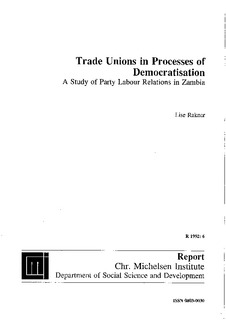| dc.contributor.author | Rakner, Lise | |
| dc.date.accessioned | 2008-03-13T08:18:32Z | |
| dc.date.accessioned | 2017-03-29T09:12:15Z | |
| dc.date.available | 2008-03-13T08:18:32Z | |
| dc.date.available | 2017-03-29T09:12:15Z | |
| dc.date.issued | 1992 | |
| dc.identifier.issn | 0803-0030 | |
| dc.identifier.uri | http://hdl.handle.net/11250/2435782 | |
| dc.description.abstract | This report assesses the role of labour in the recent transition to multi-party rule in Zambia. The main question considered is to what extent labour, through its policy-making organ the Zambia Congress of Trade Unions (ZCTU), effected policy changes at the national level in a democratic direction. The report analyses Zambian industrial relations in the post-colonial period with particular emphasis on the period of one-party rule (The Second Republic 1973). The case study concludes that the trade union movement was established in a pluralist setting and has remained autonomous from the state despite strong efforts to incorporate the union movement into the party/state. The organisational autonomy of the union movement is one of the main reasons why the trade union movement spearheaded the transition to multiparty democracy in October 1991. | |
| dc.language.iso | eng | |
| dc.publisher | Chr. Michelsen Institute. Department of Social Science and Development | |
| dc.relation.ispartofseries | Research report | |
| dc.relation.ispartofseries | R 1992: 6 | |
| dc.subject | Democracy | |
| dc.subject | Democratisation | |
| dc.subject | Trade Unions | |
| dc.subject | Zambia | |
| dc.title | Trade Unions in Processes of Democratisation. A Study of Party Labour Relations in Zambia | |
| dc.type | Research report | |
